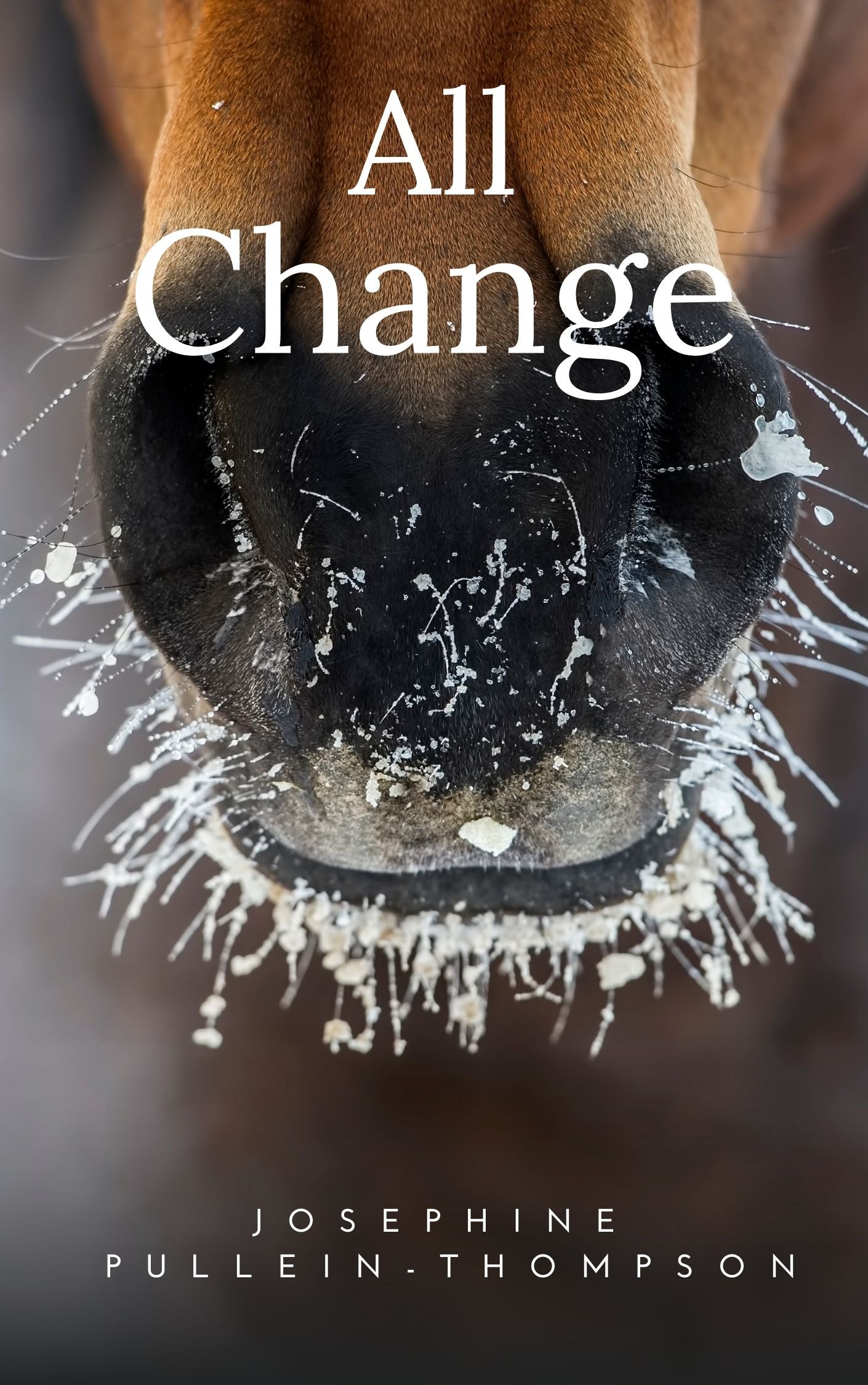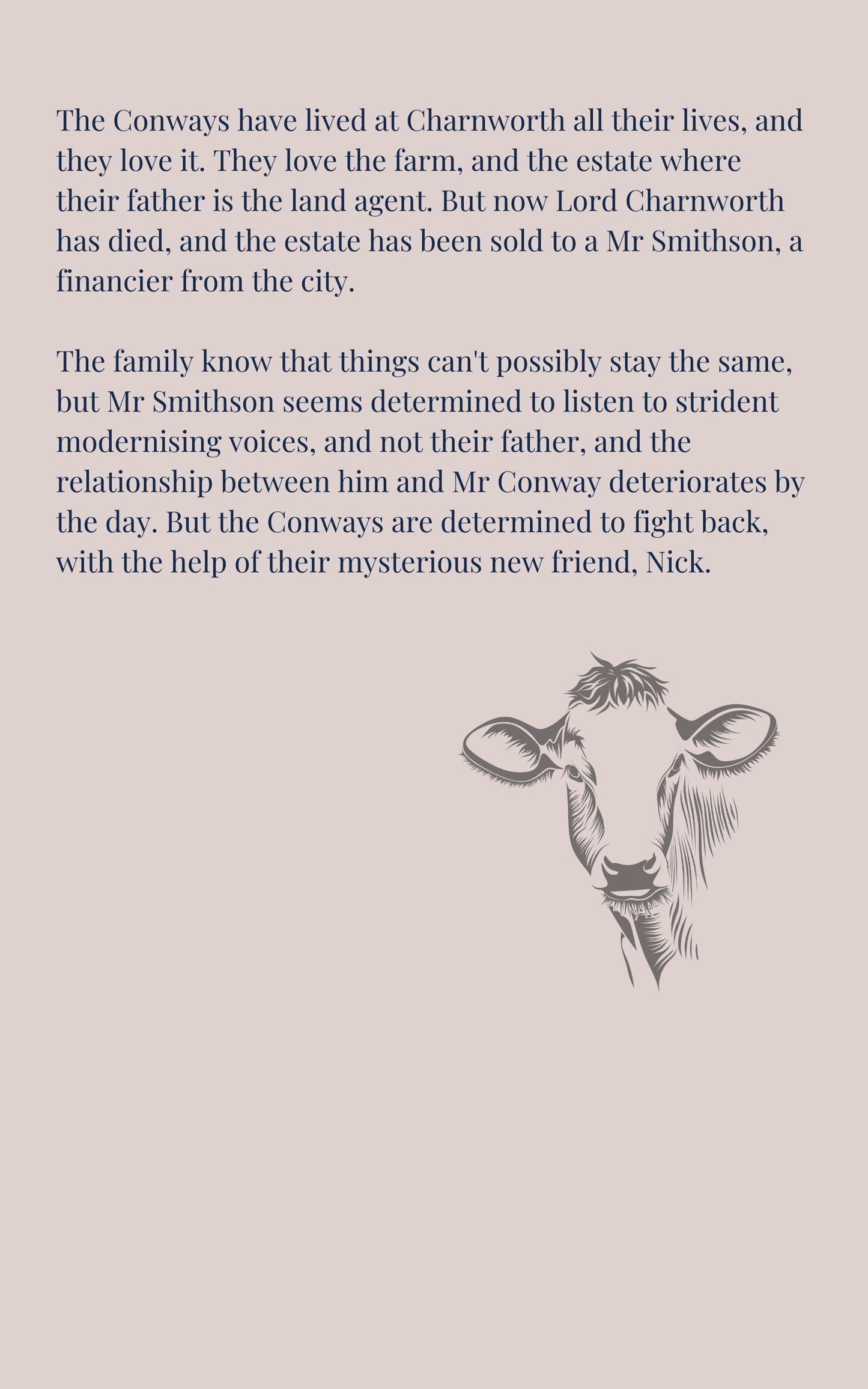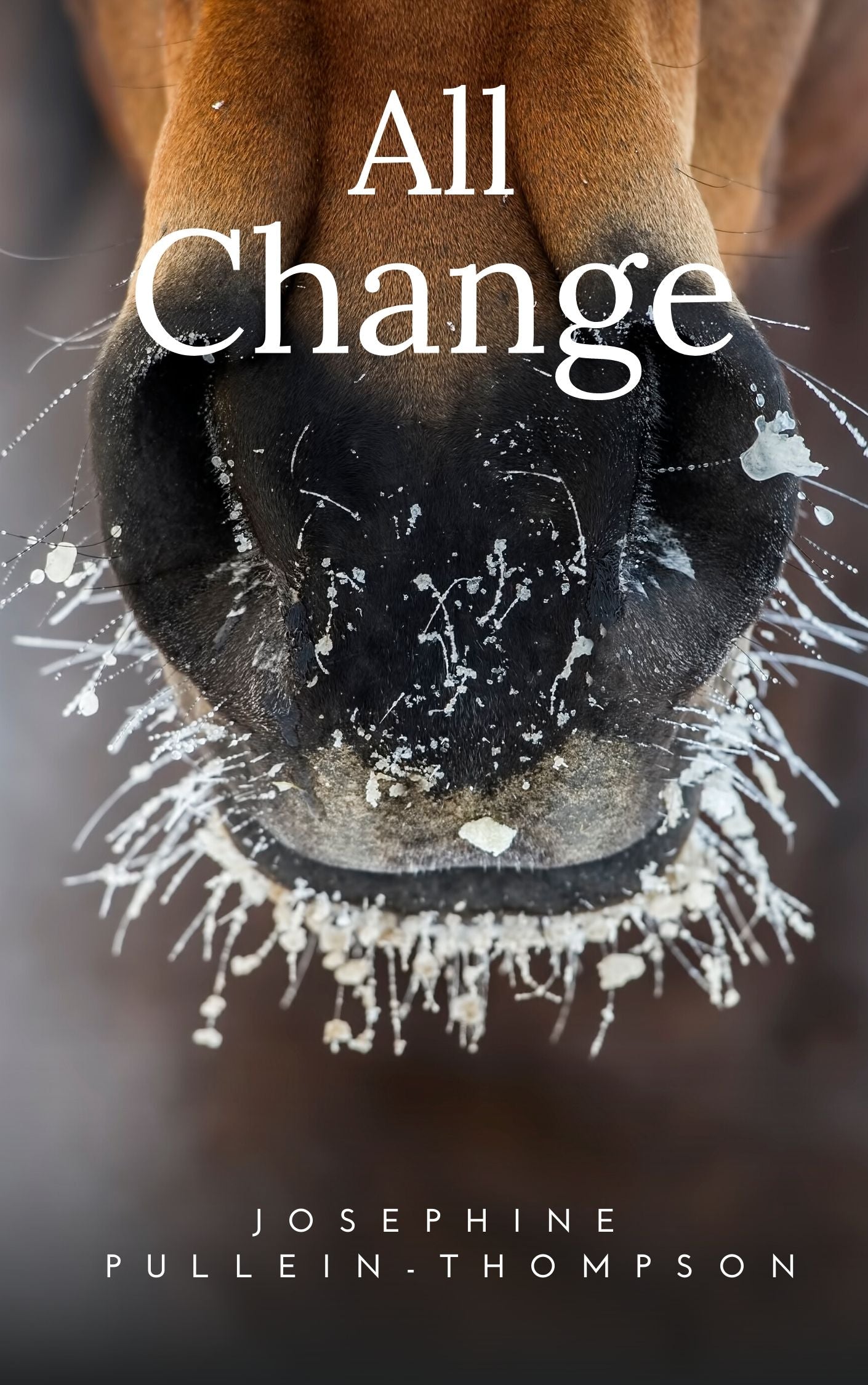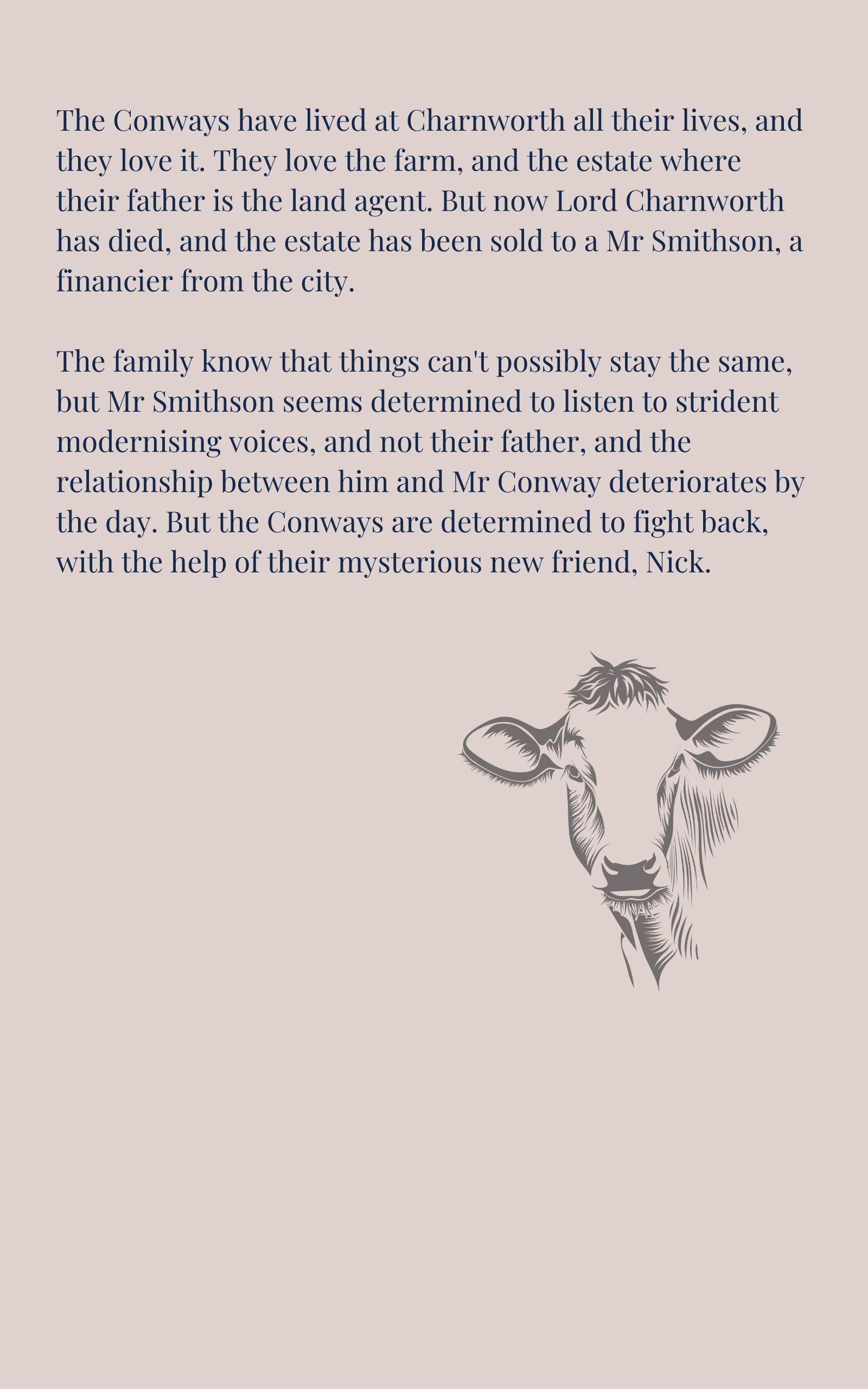Jane Badger Books
Josephine Pullein-Thompson: All Change (eBook)
Josephine Pullein-Thompson: All Change (eBook)
Couldn't load pickup availability
Share
All Change was Josephine's favourite of her books.
Page length: 182
Original publication date: 1961
How do I get my book?
How do I get my book?
There's a link to download in your confirmation email. If you need help, the email from Bookfunnel, who handle our delivery, will walk you through downloading the file that works best for you.
How do I read my eBook?
How do I read my eBook?
You can read the ebooks on any ereader (Amazon, Kobo, Nook), your tablet, phone, computer, and/or in the free Bookfunnel app.
Read a sample
Read a sample
WHEN I came home for the Christmas holidays I found the inhabitants of Nutsford Farmhouse unusually gloomy.
The human inhabitants that is; Storm, our black Labrador, was her usual bouncing, grinning self.
We had known all summer that old Lord Charnworth’s death would mean changes and that death duties would force his son to sell the Charnworth estate, but now the changes had come about and I gathered that the new owner, a Mr. Daniel Smithson, was far from perfect.
I had better explain that my father, John Conway, had been agent to old Lord Charnworth for almost eight years and had looked after the farms, woods and cottages on the Charnworth estate until they began to seem like his own. We, the five Conway children, all loved Charnworth: the big house, the yellow stone village, the brook running through the park to join the small winding river Spay, and the great downs of North Barset which sheltered us to the east and west. Naturally we were very concerned by the character of the new owner; even our house belonged to him.
My first supper at home was deadly. Andrew and Rory were on their way to bed; we don’t stay up to supper in our family until we are twelve – Andrew still has a year to go and poor Rory nearly four – and Dad said that he would seize the opportunity to ‘talk to you older ones seriously’. My father is a biggish man with dark hair and sad brown eyes; Cathy and Andrew are the most like him though Cathy has a gayer nature and Andrew’s eyes are blue.
The rest of us, Penny, Rory and I, are supposed to be like our Scottish grandfather; we have sandy hair and light blue eyes and we’re wiry instead of being well-built like Dad and Andrew or possessing neat figures like Mummy and Cathy. It’s a pity that Penny doesn’t look more like our mother because, though not a raving beauty or madly exotic or anything like that, Mummy manages to look much better than most people’s mothers and really rather stands out when you see them in the mass at school speech days or sports.
Dad looked at us sorrowfully and sighed, ‘Now look, Douglas,’ he said, ‘we’re going through a very difficult time here at the moment. I don’t know how I’m going to get on with Mr. Smithson and it’s possible that I may have to change my job, but we all love Charnworth so much that it would be a terrible wrench to leave and if I can work with him I will. Now the point is that we’ve got into the habit of treating the place rather as though it belonged to us. Old Lord Charnworth didn’t mind, in fact he often told me how much he liked to see you all enjoying yourselves. I think in a way he looked upon you as grandchildren, but Smithson isn’t going to feel like that; we’ve got to realise that we’re starting all over again from scratch and we can’t expect any of the privileges we’ve enjoyed in the past.’
‘No races in the park,’ I said, ‘no picnics in the castle ruins or short cuts through the stableyard or begging windfall peaches from old Mr. White.’
‘No, definitely not.’ Dad looked at me gravely. ‘You’re the eldest, Douglas, and you must try to be responsible.’
Everyone thinks I’m irresponsible and I’ve decided that it’s the fault of my face. I haven’t got a very dignified face. It’s a bit freckled and my nose isn’t big enough; I’ve noticed that people with hooked noses and Roman noses, and even large red fleshy noses are never accused of irresponsibility. And then my mouth is too big and instead of smiling sadly like Dad I always go and give a great grin; Cathy says it’s from ear to ear, but that is an exaggeration. And then I don’t usually feel dismal so it’s very difficult to go about in a sad and sober manner, but as for being irresponsible I don’t think it’s true. I’ve kept Rory away from ponds and rivers and cars for eight years now and at school I’m no worse than most people.
Dad said, ‘You remember that gate you smashed up when you tried to jump it last Easter? Lord Charnworth didn’t mind, I know, but I’ve a strong feeling that Mr. Smithson would. You’re to keep strictly to the lanes and bridlepaths and if not sure about any ride don’t go on it until you’ve asked me. Don’t jump any of his fences, not even low ones; just try to remember that a lot may depend upon your behaviour these holidays.’
‘O.K.,’ I said. ‘We’ll be models of tact.’
Dad looked at me and sighed so I suppose he thought I was being flippant, but I didn’t feel flippant; the thought of leaving Nutsford made me feel quite sick, but I couldn’t see any point in going round with a long face until it actually happened.
Mummy said, ‘Look, don’t tell Andrew and Rory that we might have to move, they’re a bit young to be worried with things like that and Rory will only have nightmares.’
We said we wouldn’t and then I asked, ‘What does he look like? Smithson, I mean.’
It turned out that no one but Dad had met him yet though Mummy had seen both him and Mrs. Smithson in the distance and the whole family had been scouring the gossip and financial columns of the newspapers in which they were sometimes mentioned; Andrew had cut out the best one for his scrapbook; in it Mr. Smithson was described as a ‘financial wizard’ and Mrs. Smithson as wearing ‘fabulous furs’.
Dad said, ‘He’s in his fifties; he has grey hair and spectacles. He’s just about as tall as I am and a bit on the fat side. He’s supposed to be a multi-millionaire.’
He sighed. ‘I’m spoilt,’ he said. ‘I don’t suppose if I live to be a hundred I’ll ever find another employer like Lord Charnworth.’
Mummy sighed too as she got up to clear the table. ‘And I do love this house,’ she said. ‘Why didn’t we save, John, instead of spending our money? We might have had enough to buy a farm of our own.’
‘Hardly,’ answered Dad. ‘You haven’t Mr. Smithson’s ability to calculate, Fi (her name is Fiona); it would take more than twelve years on a land-agent’s salary to save enough for a farm.’
Cathy, Penny and I helped to clear away and wash up and then we wandered along the kitchen passage and down the stone steps to our room, which is the oldest part of the farmhouse and was once a kitchen. It is long and narrow with a low ceiling and the beams are full of hooks on which sides of bacon and strings of onions used to hang. There is an enormous fireplace and a lot of shelves, which are useful for books and displays of Red Indians, farm animals or Dinky cars, and several large, dark cupboards which make tidying up easy as you just chuck everything in and force the door shut.
We lit the oil heater and crouched round it while the girls told me how dismal things were and what ages it took to walk to the field at the Firs which Dad had rented for the ponies, since Mr. Smithson could hardly be expected to let us use Long Meadow as we had in Lord Charnworth’s time. Soon, what with feeling dismal and the fact that the Old Kitchen hadn’t been used enough lately to get warmed up, we began to freeze and we decided to go up to the girls’ bedroom which has a really efficient electric fire. We hadn’t been there long when Andrew and Rory appeared; they were wearing pyjamas, tartan rugs and Indian head-dresses.
‘Go back to bed,’ we said sternly.
‘Won’t,’ answered Rory. ‘Go to the devil.’ And Andrew, always more reasonable, explained, ‘Rory can’t sleep and he wakes me up every two minutes by asking if I’m awake and now you’re all up here talking it’s hopeless.’
‘Let them stay for a bit,’ suggested Cathy and rather grudgingly we made room for them by the fire.
Then we couldn’t talk about the awful possibility of having to leave Nutsford any more so we just sat and grumbled about Mr. Smithson.
‘All the rides are ruined,’ complained Penny, ‘and there’s nothing to jump, not even the fallen-down trees in the park.’
‘They’re not all ruined,’ remonstrated Cathy. ‘There’s still the downs and the track to the river and the bridlepath on Forest Hill.’
‘Yes, I know, but you can’t make a decent round any more,’ grumbled Penny, ‘and I hate coming back the same way as I went out. I’d like to put a curse on Mr. Smithson; he’s ruining everything.’
‘You could make a waxen image and stick pins into it,’ suggested Andrew dreamily.
‘That wouldn’t make him go away,’ said Penny. ‘He’d just think he had rheumatism and call in a Harley Street specialist.’
‘He might think the climate of Charnworth had given him the rheumatism,’ I suggested, ‘and that would send him flying back to Mayfair or wherever he hangs out.’
‘Of course he hasn’t actually said that we’re not to ride through the park,’ Cathy pointed out. ‘It’s just that Dad doesn’t feel like asking for permission yet.’
‘I wish he’d hurry up and ask about Long Meadow,’ said Penny. ‘It wastes ages every single day walking up to the Firs and, anyway, it’ll seem awfully silly if we don’t ride in the park for months and then when Dad asks him he says it’s all right.’
‘But you’ve got to be tactful at first,’ I told her. ‘Millionaires need very careful handling.’
‘And Dad doesn’t like asking favours,’ said Cathy.
‘And I don’t blame him,’ I added, ‘it’s beastly, especially from people you don’t like.’
We were silent for a little and then I said, ‘If only we could do something for Mr. Smithson; something that filled him with eternal gratitude, then he’d say, with a choke in his voice, “Conway, if there’s anything I can do for those children of yours any time just let me know.” Surely then Dad would mention Long Meadow.’
‘I bet he wouldn’t,’ Penny was determined to be pessimistic,‘ he’d say, “That’s quite all right, Mr. Smithson, it’s a pleasure; please don’t mention it,’’ and we’d have to go on walking all the way to the Firs. Besides, what can you do for millionaires? He can pay people vast sums to do anything he wants done.’
‘We could save his life,’ suggested Andrew. ‘We could plunge fully dressed into the lake when he was drowning.’
‘Even if he was idiotic enough to fall into the lake, he jolly well ought to be able to swim,’ objected Penny.
‘I bet he can’t,’ said Rory, who can’t swim himself.
‘The house might catch fire,’ suggested Cathy, ‘or thieves might steal Mrs. Smithson’s fabulous furs, but I don’t see how we’re to get near enough to see what’s going on if we’re not allowed in the park.’
‘The path from South Lodge to the church,’ said Penny, ‘that’s a right of way, surely?’
‘It might not be a bridlepath,’ I said, ‘but there’s a hunting gate at either end so probably it is. Yes, that gets us quite near to the house and practically on the brink of the lake. We could do a sort of daily patrol.’
‘I wish we could meet him,’ said Andrew, ‘after all, he might like us; people do sometimes. At least old Lord Charnworth seemed to, even though he couldn’t remember our names and always called Douglas David.’
Who's in the book?
Who's in the book?
Humans: The Conways: Douglas, Cathy, Penny, Andrew and Rory. Nick, Mr and Mrs Smithson
Equines: Merlin, Jessica, Shamrock
and Carmen the cow
Other titles published as
Other titles published as
The Hidden Horse
Series order
Series order




